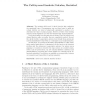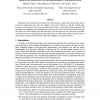198 search results - page 1 / 40 » Time Equations for Lazy Functional (Logic) Languages |
AGP
2003
IEEE
13 years 9 months ago
2003
IEEE
There are very few approaches to measure the execution costs of lazy functional (logic) programs. The use of a lazy execution mechanism implies that the complexity of an evaluation...
ICFP
2009
ACM
14 years 5 months ago
2009
ACM
Functional logic programming and probabilistic programming have demonstrated the broad benefits of combining laziness (non-strict evaluation with sharing of the results) with non-...
CORR
2004
Springer
13 years 4 months ago
2004
Springer
Many functional logic languages are based on narrowing, a unification-based goal-solving mechanism which subsumes the reduction mechanism of functional languages and the resolutio...
ESOP
2012
Springer
12 years 6 days ago
2012
Springer
The existing call-by-need λ calculi describe lazy evaluation via equational logics. A programmer can use these logics to safely ascertain whether one term is behaviorally equivale...
DFT
2007
IEEE
13 years 11 months ago
2007
IEEE
We propose and evaluate the use of lazy error detection for a superscalar, out-of-order microprocessor’s functional units. The key insight is that error detection is off the cri...


